Editorial - Big data - small meaning and global discourses
By Camilla Moring, University of Copenhagen and Sara Kjellberg, Lund University.
The present publication is the result of a collaboration between information studies researchers from the Department of Arts and Cultural Sciences, Lund University and the Royal School of Library and Information Science at University of Copenhagen: Big data — small meaning and global discourses funded by the The Einar Hansen Foundation.
The collaboration focuses on the challenges of the information society as it meets the tensions between the possibilities opening up through the global cross-connecting of large amounts of data (Big Data) and their interpretations in a local context. Our interest lies in both, in the relation to the global development of the Internet and new forms of knowledge production, as well as in the fact that interpretations and meanings are rooted in local contexts. From a humanities perspective, a range of challenging and unexplored questions about the future of the Internet and the emerging infrastructure of the information society are located in this intersection.
We asked the bibliometrics researcher Fredrik Åström to comment two maps of Big Data that he had produced based on Web of Science content. On the first conceptual map, which is based on titles, abstracts and keywords from research literature on big data, he comments as follows:
- The map show two basic themes in Big Data research: social aspects, covering issues such as privacy and trust; and technical aspects such as algorithms for clustering and classification, as well as programming models and network computing.
He continues to comment the second map based on scientific journals being cited together in big data research:
- This shows three research areas of importance in big data research: on the right side, a cluster of medical and biomedical research literature, with a focus on genetics research and how that is applied in cancer research; on the lower left a cluster of computer science and information systems research literature, focusing on machine learning and pattern analysis; and on the upper left, social science research literature, reflecting research on big data issues in economy and management, information science/studies, and to some extent psychology.
Despite the fact that there are important issues that are otherwise discussed in the humanities, such as privacy concerns and trust, humanities perspectives on big data are quite invisible in this global database. Thus we see a need to highlight and prioritize humanities perspectives on network technologies and digital media. Without such a focus there is a risk that local cultures will become marginalized and trivialized, and the infrastructure of the information society may become an object of mere technology development and measured in relation to pure economic interests.
We have met in a series of workshops. At each workshop an external researcher was invited to present an open lecture on a specific topic related to Big Data in the humanities. After each lecture the discussions continued among the researchers from the two universities. Besides this the group arranged a panel at an international conference with connections to the theme of our collaboration.
In the present publication you find a variety of texts. There are interviews with our guest lecturers from the workshops, a report from the conference panel, a correspondence played out by e-mail between two of the researchers in the collaboration, but also articles on topics of interest to the participating researchers. All with relevance to Big Data in terms of small meaning and global discourses.
Enjoy reading!
/Camilla Moring and Sara Kjellberg, Copenhagen and Malmö 28 November 2016
